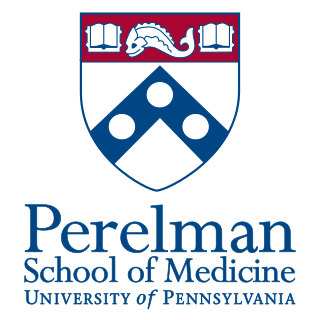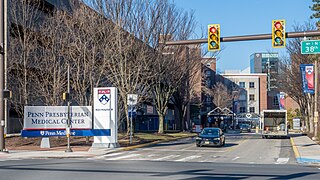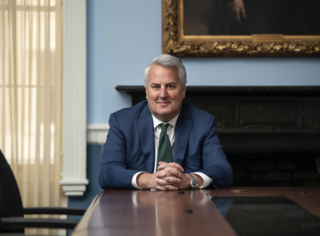
The University of Pennsylvania, commonly referenced as Penn or UPenn, is a private Ivy League research university in Philadelphia, Pennsylvania, United States. It is one of nine colonial colleges and was chartered prior to the U.S. Declaration of Independence when Benjamin Franklin, the university's founder and first president, advocated for an educational institution that trained leaders in academia, commerce, and public service. Penn identifies as the fourth-oldest institution of higher education in the United States, though this representation is challenged by other universities since Franklin first convened the board of trustees in 1749, arguably making it the fifth-oldest.

The Walter Reed Army Medical Center (WRAMC), officially known as Walter Reed General Hospital (WRGH) until 1951, was the U.S. Army's flagship medical center from 1909 to 2011. Located on 113 acres (46 ha) in Washington, D.C., it served more than 150,000 active and retired personnel from all branches of the United States Armed Forces. The center was named after Walter Reed, a U.S. Army physician and sergeant who led the team that confirmed that yellow fever is transmitted by mosquitoes rather than direct physical contact.

The Children's Hospital of Philadelphia, also known by its acronym CHOP, is a children's hospital in Philadelphia, Pennsylvania. Its primary campus is located in the University City neighborhood of West Philadelphia on the campus of the University of Pennsylvania. The hospital has 594 beds and more than one million outpatient and inpatient visits annually. It is one of the world's largest and oldest children's hospitals and the first hospital in the United States dedicated to the healthcare of children.

The University of Texas MD Anderson Cancer Center is a comprehensive cancer center in Houston, Texas. It is the largest cancer center in the world and one of the original three NCI-designated comprehensive cancer centers in the country. It is both a degree-granting academic institution and a cancer treatment and research center located within Texas Medical Center (TMC), Houston, the largest medical center and life sciences destination in the world. MD Anderson Cancer Center has consistently ranked #1 among the best hospitals for cancer care and research in the U.S. and worldwide, and it has held the #1 position 20 times in the last 23 years in U.S. News & World Report's Best Hospitals rankings for cancer care. As of 2023, MD Anderson Cancer Center is home to the highest number of cancer clinical trials in the world and has received more NCI-funded projects than any other U.S. institute. In 2024, Newsweek placed MD Anderson at #1 in their annual list of the World's Best Specialized Hospitals in oncology.

In medicine, proton therapy, or proton radiotherapy, is a type of particle therapy that uses a beam of protons to irradiate diseased tissue, most often to treat cancer. The chief advantage of proton therapy over other types of external beam radiotherapy is that the dose of protons is deposited over a narrow range of depth; hence in minimal entry, exit, or scattered radiation dose to healthy nearby tissues.
Leonard Abramson is a philanthropist and the founder and former CEO of U.S. Healthcare.
The University of Pennsylvania Health System (UPHS) is a major multi-hospital health system headquartered in Philadelphia, Pennsylvania. UPHS and the Perelman School of Medicine at the University of Pennsylvania together comprise Penn Medicine, a clinical and research entity of the University of Pennsylvania. UPHS hospitals include the Hospital of the University of Pennsylvania, Penn Presbyterian Medical Center, Pennsylvania Hospital, Chester County Hospital, Lancaster General Hospital, and Princeton Medical Center.

The Perelman School of Medicine, commonly known as Penn Med, is the medical school of the University of Pennsylvania, one of seven Ivy League medical schools in the United States. The medical school is based in Philadelphia. Founded in 1765, it was the first medical school in the United States.

Penn Presbyterian Medical Center, sometimes called Presby, is a hospital located in the University City section of West Philadelphia. It was founded by Reverend Ephraim D. Saunders in 1871 and formally joined the University of Pennsylvania Health System in 1995. Penn Presbyterian is spread out on a campus bounded by Market Street, Powelton Avenue, 38th Street, and Sloan Street.

The Robert Wood Johnson University Hospital (RWJUH) is a 965-bed hospital with campuses in New Brunswick, and Somerville, New Jersey, and serves as a flagship hospital of RWJBarnabas Health.
Stephen Gould Emerson is an American academic who was the 13th president of Haverford College from July 1, 2007, to August 10, 2011. In February 2012, he was appointed Director of the Herbert Irving Comprehensive Cancer Center at NewYork-Presbyterian Hospital/Columbia University Medical Center, and he will also hold the Clyde ’56 and Helen Wu Professorship in Immunology at the Columbia University Vagelos College of Physicians and Surgeons.

The Hospital of the University of Pennsylvania (HUP) is the flagship hospital of Penn Medicine and is located in the University City section of West Philadelphia. It is consistently ranked as one of the top hospitals in the United States.

Stephen Michael Hahn is an American physician who served as the commissioner of food and drugs from 2019 to 2021. Before becoming commissioner, he was an oncologist serving as chief medical executive of the MD Anderson Cancer Center. In 2021, he became chief medical officer at Flagship Pioneering, the venture capital firm that launched Moderna.
Walter "Wally" J. Curran, Jr. is an American radiation oncologist specializing in the treatment of malignant brain tumors and locally advanced lung cancer.

Carl H. June is an American immunologist and oncologist. He is currently the Richard W. Vague Professor in Immunotherapy in the Department of Pathology and Laboratory Medicine at the Perelman School of Medicine of the University of Pennsylvania. He is most well known for his research on T cell therapies for the treatment of several forms of cancers. In 2020 he was elected to the American Philosophical Society.

Jay Steven Loeffler was an American physician at Massachusetts General Hospital, where he served as chair of the Department of Radiation Oncology since 2000. He was the Herman and Joan Suit Professor of Radiation Oncology and professor of neurosurgery at Harvard Medical School.
Susan M. Domchek is an oncologist at the University of Pennsylvania, Executive Director of the Basser Center for BRCA, the Basser Professor in Oncology at the Perelman School of Medicine, and Director of the Mariann and Robert MacDonald Cancer Risk Evaluation Program at Penn Medicine. She has authored more than 250 articles in scholarly journals. In 2018, Domchek was elected to the National Academy of Medicine.
Donald M. O'Rourke is an American neurosurgeon and the John Templeton, Jr., MD Professor of Neurosurgery at the Perelman School of Medicine at the University of Pennsylvania. He graduated from Harvard University with an A.B. in Biochemistry and Molecular Biology in 1983, and attended medical school at the University of Pennsylvania where he also completed neurosurgical residency training.
Marie Celeste Simon is the Arthur H. Rubenstein Professor of cell and developmental biology, the scientific director of the Abramson Family Cancer Research Institute, and the associate director of the Abramson Cancer Center Core Facilities, at the University of Pennsylvania Perelman School of Medicine. Her research focuses on cancer cell metabolism, angiogenesis, and immunology.

Nadia Lauren Dowshen is an American pediatrician and adolescent medicine physician. She specializes in the care of youth living with HIV infection and medical care to transgender and gender-diverse youth. Dowshen researches health inequality, access to care, and promoting resilience in LGBT youth. As an associate professor at the Perelman School of Medicine at the University of Pennsylvania, she is also the medical director and co-founder of the Gender and Sexuality Development Clinic.















